CCRN
CCRN
Page 2 out of 961 results
Sort by
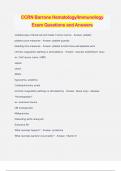
-
CCRN Barrons Hematology/Immunology Exam Questions and Answers
- Exam (elaborations) • 6 pages • 2024
- Available in package deal
-
- $11.49
- + learn more
CCRN Barrons Hematology/Immunology Exam Questions and Answers smallest type of blood cell and made in bone marrow - Answer- platelet platelet count measures - Answer- platelet quantity bleeding time measures - Answer- platelet function/how well platelets work intrinsic coagulation pathway is stimulated by - Answer- vascular endothelium injury ex: Cell trauma (valve, IABP) sepsis shock ARDs hypoxemia, acidemia Cardiopulmonary arrest extrinsic coagulation pathway is stimulated by - Ans...
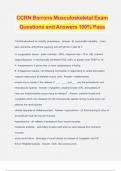
-
CCRN Barrons Musculoskeletal Exam Questions and Answers 100% Pass
- Exam (elaborations) • 3 pages • 2024
- Available in package deal
-
- $10.49
- + learn more
CCRN Barrons Musculoskeletal Exam Questions and Answers 100% Pass Contraindications for mobility progression - Answer- M: myocardial instability - chest pain, ischemia, arrhythmia requiring anti arrhythmic in last 24 h O: oxygenation issues - pulse oximetry < 90%, response rate <10 or >35, extreme fatigue/dyspnea. If mechanically ventilated FiO2 >60% or greater than PEEP of 10 V: Vasopressors- if pt has two or more vasopressors infusing E: Engagement issues- not following comm...
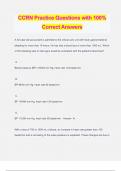
-
CCRN Practice Questions with 100% Complete Solutions A patient has had a large anterior myocardial infarction last month and developed a ventricular aneurysm. He now has episodes of ventricular tachycardia that are not prevented or converted with antidysr
- Exam (elaborations) • 158 pages • 2024
- Available in package deal
-
- $14.49
- + learn more
CCRN Practice Questions with 100% Correct Answers A 52-year-old accountant is admitted to the critical care unit with frank gastrointestinal bleeding for more than 18 hours. He has had a blood loss of more than 1000 mL. Which of the following sets of vital signs would be consistent with the patient's blood loss? A. Blood pressure (BP) 100/84 mm Hg, heart rate 124 beats/min B. BP 86/40 mm Hg, heart rate 92 beats/min C. BP 124/66 mm Hg, heart rate 124 beats/min D. BP 112/60 mm Hg, hea...
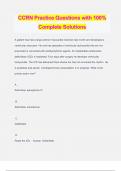
-
CCRN Practice Questions with 100% Complete Solutions
- Exam (elaborations) • 59 pages • 2024
- Available in package deal
-
- $13.49
- + learn more
CCRN Practice Questions with 100% Complete Solutions A patient has had a large anterior myocardial infarction last month and developed a ventricular aneurysm. He now has episodes of ventricular tachycardia that are not prevented or converted with antidysrhythmic agents. An implantable cardioverter- defibrillator (ICD) is implanted. Four days after surgery he develops ventricular tachycardia. The ICD has delivered three shocks but has not converted the rhythm. He is pulseless and apneic. C...
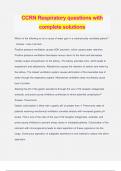
-
CCRN Respiratory questions with complete solutions
- Exam (elaborations) • 51 pages • 2024
- Available in package deal
-
- $13.49
- + learn more
CCRN Respiratory questions with complete solutions Which of the following is not a cause of water gain in a mechanically ventilated patient? - Answer- Loss of protein Positive pressure ventilation causes ADH secretion, which causes water retention. Positive pressure ventilation decreases venous return to the heart and decreases cardiac output and perfusion to the kidney. The kidney secretes renin, which leads to angiotensin and aldosterone. Aldosterone causes the retention of sodium and w...
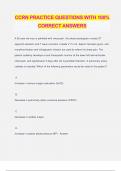
-
CCRN PRACTICE QUESTIONS WITH 100% CORRECT ANSWERS
- Exam (elaborations) • 63 pages • 2024
- Available in package deal
-
- $13.49
- + learn more
CCRN PRACTICE QUESTIONS WITH 100% CORRECT ANSWERS A 62-year-old man is admitted with chest pain. His electrocardiogram reveals ST segment elevation and T wave inversion in leads V1 to V4. Aspirin has been given, and morphine titration and nitroglycerin infusion are used to relieve his chest pain. The patient suddenly develops a loud holosystolic murmur at the lower left sternal border, chest pain, and hypotension 5 days after his myocardial infarction. A pulmonary artery catheter is inser...
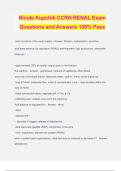
-
Nicole Kupchik CCRN RENAL Exam Questions and Answers 100% Pass
- Exam (elaborations) • 29 pages • 2024
- Available in package deal
-
- $12.49
- + learn more
Nicole Kupchik CCRN RENAL Exam Questions and Answers 100% Pass main functions of the renal system - Answer- filtration, reabsorption, secretion acid base balance, bp regulation (RAAS), erythropoietin (hgb production), electrolyte balances -approximately 20% of cardiac output goes to the kidneys the nephron - Answer- -glomerulus: network of capillaries, filters blood -proximal convoluted tubule: reabsorbs water, sodium, amino acids & glucose -loop of henle: reabsorbs Na+, water & concentr...
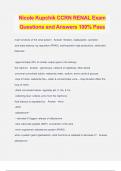
-
Nicole Kupchik CCRN RENAL Exam Questions and Answers 100% Pass
- Exam (elaborations) • 29 pages • 2024
- Available in package deal
-
- $12.49
- + learn more
Nicole Kupchik CCRN RENAL Exam Questions and Answers 100% Pass main functions of the renal system - Answer- filtration, reabsorption, secretion acid base balance, bp regulation (RAAS), erythropoietin (hgb production), electrolyte balances -approximately 20% of cardiac output goes to the kidneys the nephron - Answer- -glomerulus: network of capillaries, filters blood -proximal convoluted tubule: reabsorbs water, sodium, amino acids & glucose -loop of henle: reabsorbs Na+, water & concentr...
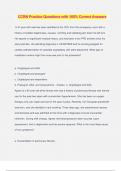
-
CCRN Practice Questions with 100% Correct Answers
- Exam (elaborations) • 113 pages • 2024
- Available in package deal
-
- $14.49
- + learn more
CCRN Practice Questions with 100% Correct Answers A 47-year-old male has been admitted to the CCU from the emergency room with a history of sudden diaphoresis, nausea, vomiting and radiating pain down his left arm. He reports no significant medical history, and has been a two PPD smoker since his early twenties. His admitting diagnosis is UA/NSTEMI and he is being prepped for cardiac catheterization for possible angioplasty with stent placement. What type of medication orders might the nur...
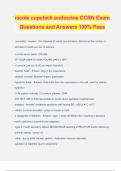
-
nicole cupchick endocrine CCRN Exam Questions and Answers 100% Pass
- Exam (elaborations) • 20 pages • 2024
- Available in package deal
-
- $12.49
- + learn more
nicole cupchick endocrine CCRN Exam Questions and Answers 100% Pass osmolality - Answer- -the measure of solute concentration, defined as the number of osmoles of solute per liter of solution -normal serum osmo: 275-295 -IF YOUR OSMO'S HIGH YOU'RE LIKELY DRY -if osmo's Low you're diLute (water retention) Isotonic fluids - Answer- stay in the vasculature -sodium chloride, lactated ringers, plasmalyte hypotonic fluids - Answer- fluid shifts from the vasculature to the cell- used for c...

How did he do that? By selling his study resources on Stuvia. Try it yourself! Discover all about earning on Stuvia


